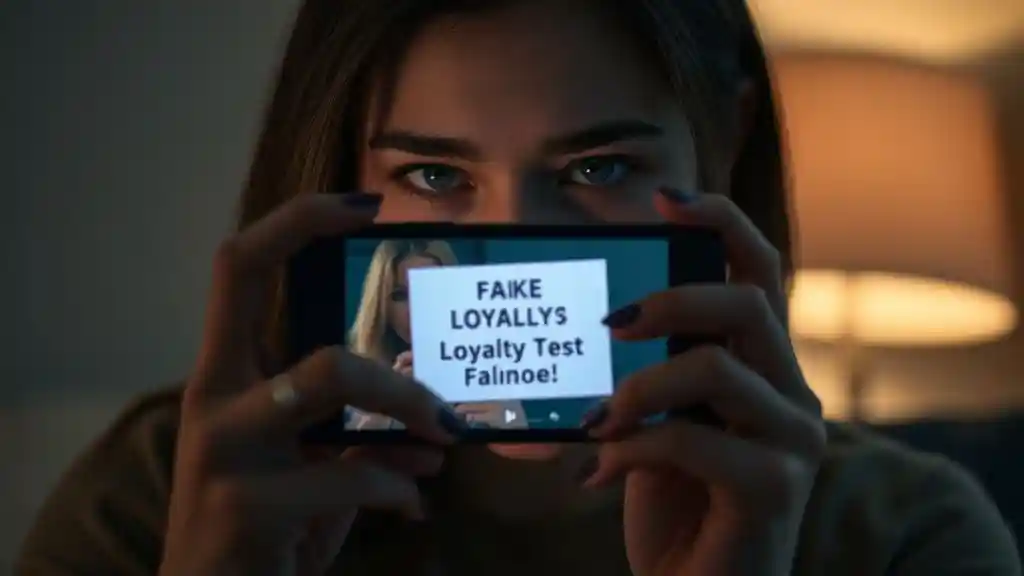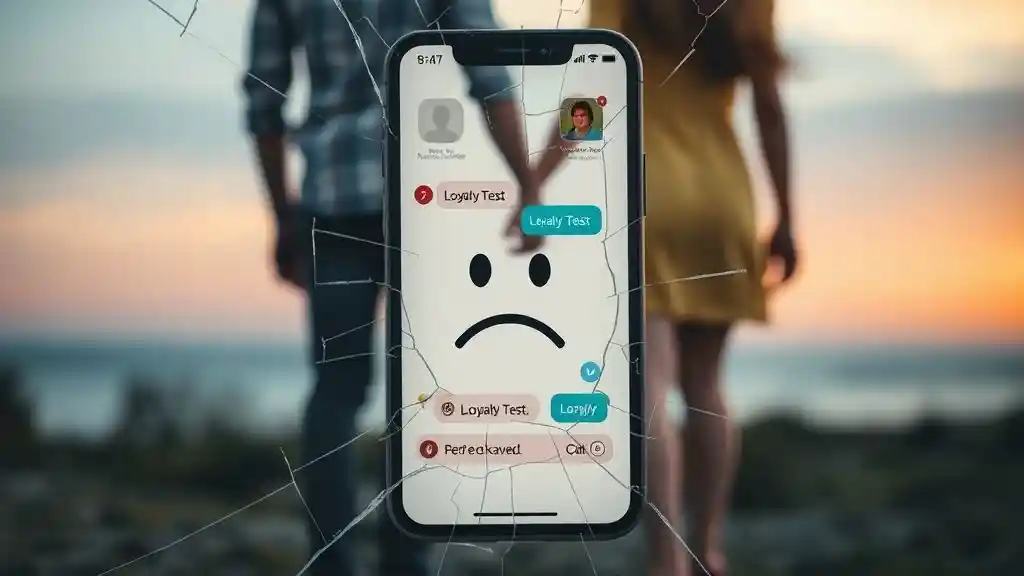
Loyalty Tests in Relationships: A Trend That’s Turning Toxic
It starts with a DM.
A stranger hits up your boyfriend or girlfriend on Instagram, flirty and curious. You don’t know this person — but you do know the game: you sent them. Or maybe someone else did it on your behalf.
Welcome to 2025’s most disturbing dating trend: the loyalty test in relationships.
If you need to trap someone to prove they love you, you have already lost the love.
And worse — you just handed the relationship a slow, brutal death sentence.
What Is a Loyalty Test in Relationships (And Why Is It So Dangerous)?
A “loyalty test” is when someone tries to “test” their partner’s faithfulness — usually without their knowledge — by sending in a third person to flirt, tempt, or trap them. This happens online, mostly through:
- Fake Instagram accounts
- Hired “loyalty testers” (yes, that’s a thing now)
- YouTube/social media creators running these setups for content
What looks like “proof” of love is actually emotional entrapment, trust erosion, and often public humiliation.
It’s not just childish. It’s cruel.
The Sick Game of Manufactured Betrayal
Let’s call it what it is:
Loyalty tests are digital emotional warfare. You’re setting a trap, waiting for your partner to slip — and then celebrating when they fall.
Even if they pass the test, what have you really gained?
- You now know you couldn’t trust them without spying.
- They now know you don’t believe in them.
- You both feel dirty. Even if nothing happened.
And if they fail the test?
You didn’t uncover the truth.
You created a scenario that didn’t exist — and called it “evidence.”
Loyalty tests are emotional manipulation disguised as curiosity. And it’s breaking couples in half.
Social Media Made This Normal — But It’s Not Healthy
- “I tested my boyfriend’s loyalty — and you won’t believe what happened!”
- “We caught her cheating LIVE!”
- “Exposing cheaters for fun and views.”
But here’s what they don’t show you:
- The psychological trauma this causes
- The paranoia it feeds in young minds
- The relationships destroyed in silence
- The deep regret that hits after the high fades
This isn’t love.
This isn’t “just for fun.”
This is toxic voyeurism dressed up as romance.
Red Flags of a Loyalty-Test Culture
- You feel tempted to “check” your partner’s DMs
- You obsessively watch loyalty test videos and wonder “what if…”
- You justify spying because you were hurt in the past
These aren’t instincts from a place of love.
They’re responses born from fear, past wounds, and social pressure. And acting on them won’t give you peace — it’ll give you more pain.

Let’s Be Brutally Honest: Why Do You Want to Test Them?
You want control.
You want to prove your fears right or wrong — but without admitting you’re scared.
But here’s the savage truth:
You can’t control someone into loving you right.
You can’t force honesty by starting with a lie.
If you suspect cheating — talk.
If you feel unsafe — leave.
But don’t manufacture betrayal just to confirm your heartbreak. That’s not love. That’s emotional suicide.
Real Loyalty Doesn’t Need Proof
Loyalty isn’t proven in traps. It’s proven in:
- How someone shows up daily
- How they respect you when no one’s watching
- How they communicate even when it’s hard
- How they handle temptation without needing to be monitored
You’re not a detective. You’re a partner.
The moment you switch roles, the relationship stops being mutual and becomes a case file.
The Fallout — And How to Build Real Trust Instead(Target keyword: “social media loyalty test”)
LSI keywords: fake loyalty test, relationship trust issues, toxic social media behavior, testing your partner online, emotional manipulation in dating)
When Trust Becomes a Performance
Let’s get brutally honest here: If your relationship needs a “test,” it’s already bleeding somewhere deep. Loyalty isn’t something proven under a spotlight—it’s something lived in the dark, in quiet choices, in private sacrifices.
But in 2025, the “social media loyalty test” trend is turning raw emotion into viral entertainment. Strangers slide into your partner’s DMs pretending to flirt, then screenshot their reactions to post online. It’s a setup. A trap. A way to make someone fail rather than let them be real.
And here’s what happens when you treat love like a game show:

The Real Fallout of Fake Tests
Every time you test them, you’re silently showing them that your love comes with suspicion, not safety.
- When they find out (and they always do), they’ll question everything.
- You’ve shown you’d rather trick them than talk to them.
2. You’re reinforcing toxic suspicion.
- Love turns paranoid. Every DM, every comment, every follow becomes suspicious.
- You’re planting fear instead of planting safety.
3. You’re broadcasting your pain to people who don’t care.
- You’re sacrificing privacy for clout. And once it’s out, you can’t undo it.
4. You’re using manipulation, not communication.
- Loyalty can’t be extracted—it must be given freely.
Here’s the Deeper Problem: You Don’t Feel Safe
Let’s stop here. Breathe.
And it’s not a shameful thing. It’s human. But it’s a signal.
- Maybe you’ve been cheated on before.
- Maybe you’ve never felt truly chosen.
- Maybe you’re afraid they’ll do what someone else did.
But guess what? The answer isn’t a trap. The answer is honest conversation.
What Real Communication Sounds Like
Here’s how it looks when love matures:
- “Hey, I’ve been feeling insecure. Can we talk about how we show commitment?”
- “I trust you, but social media messes with my head. Can we set boundaries that feel safe for both of us?”
This is grown-up love. This is love that protects both people.

If You’ve Already Done a Loyalty Test… Read This
If you’re reading this with a pit in your stomach because you’ve already pulled one of these fake fidelity stunts—this next part is for you.
You messed up. But you’re not unworthy of love. You’re just learning.
Here’s how to fix it:
- Own it. No excuses.
- “I did something manipulative. I tried to test you instead of trusting you. That was wrong.”
- Explain what drove you.
- Vulnerability is not weakness. It builds bridges. Let them see the hurt, not just the control.
- Apologize and ask what they need to rebuild.
- This is not about you feeling better. It’s about letting them decide if they can trust you again.
- Do the inner work.
- A therapist. A journal. A hard look at your past. Heal the wound that made you act from fear.
If Someone Tested You…
You didn’t deserve it. You didn’t invite it. You’re not “guilty” for being human.
But now, you face a question: Can you trust someone who played you like a game?
Here’s a checklist to ask yourself:
- Are they more focused on defending their actions than hearing your hurt?
- Do they have a pattern of testing, spying, or controlling behavior?
If it’s just immaturity and they’re willing to grow, maybe there’s something worth saving.
But if it’s a repeated thing, run. You are not a lab rat. You’re a person. You deserve love without surveillance.
Real Loyalty Doesn’t Need a Test
- Loyalty is in the little things.
- It’s how they handle temptation when no one’s watching.
- It’s how safe you feel just sitting beside them, no words, no tests, no doubts.
Social media turned love into a performance. But your heart isn’t a stage.
If You Want to Heal, Start Here:
- Delete the accounts that encourage this toxic behavior.
- You know the ones. The ones that profit from your pain.
- Unfollow the drama pages.
- You’re not a voyeur. You’re healing. Don’t feed your insecurity with poison.
- Start a real conversation about loyalty.
- What does it mean to you? What do you need to feel secure?
- Make a no-test pact with your partner.
- “We’ll never test each other’s love with games. Only words. Only truth.”

Final Word
Loyalty is not a TikTok trend. It’s not a bait trap. It’s not something you force someone to prove.
If you’re truly loved, you won’t have to test it. You’ll feel it. Every day. Quietly. Deeply. Without question.
So burn the script. Break the cycle.
Because if you’re still testing them…
You haven’t learned how to trust yourself yet.
And that’s where the real healing begins.
Disclaimer: This post is for informational and emotional support purposes only. Every relationship is unique, and this is not professional legal, medical, or mental health advice. Read our full disclaimer.
Affiliate Disclosure: Some links in this post may be affiliate links. If you make a purchase through them, I may earn a small commission at no extra cost to you. Learn more here.
Pingback: She’s His Ex But I Feel Like the Third Wheel - Love and Breakups
Pingback: 7 Silent Signs When A Woman Is ATTRACTED - Love and Breakups
It is actually a great and useful piece of info. I am happy that you shared this helpful information with us. Please stay us up to date like this. Thanks for sharing.